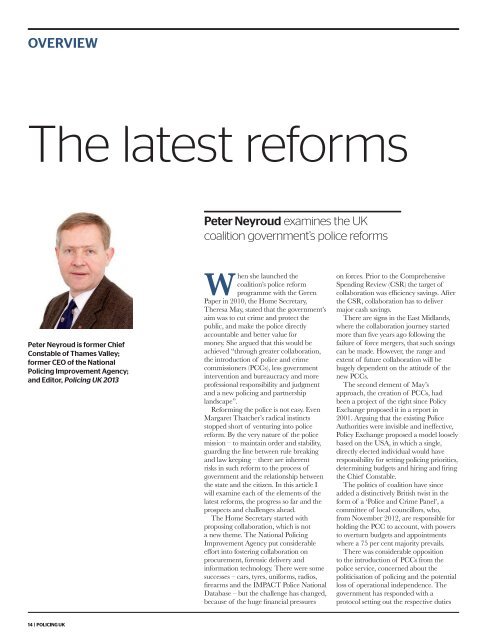Policing UK 2013 - Police Federation
Policing UK 2013 - Police Federation
Policing UK 2013 - Police Federation
You also want an ePaper? Increase the reach of your titles
YUMPU automatically turns print PDFs into web optimized ePapers that Google loves.
OVERVIEW<br />
The latest reforms<br />
Peter Neyroud examines the <strong>UK</strong><br />
coalition government’s police reforms<br />
Peter Neyroud is former Chief<br />
Constable of Thames Valley;<br />
former CEO of the National<br />
<strong>Policing</strong> Improvement Agency;<br />
and Editor, <strong>Policing</strong> <strong>UK</strong> <strong>2013</strong><br />
When she launched the<br />
coalition’s police reform<br />
programme with the Green<br />
Paper in 2010, the Home Secretary,<br />
Theresa May, stated that the government’s<br />
aim was to cut crime and protect the<br />
public, and make the police directly<br />
accountable and better value for<br />
money. She argued that this would be<br />
achieved “through greater collaboration,<br />
the introduction of police and crime<br />
commissioners (PCCs), less government<br />
intervention and bureaucracy and more<br />
professional responsibility and judgment<br />
and a new policing and partnership<br />
landscape”.<br />
Reforming the police is not easy. Even<br />
Margaret Thatcher’s radical instincts<br />
stopped short of venturing into police<br />
reform. By the very nature of the police<br />
mission – to maintain order and stability,<br />
guarding the line between rule breaking<br />
and law keeping – there are inherent<br />
risks in such reform to the process of<br />
government and the relationship between<br />
the state and the citizen. In this article I<br />
will examine each of the elements of the<br />
latest reforms, the progress so far and the<br />
prospects and challenges ahead.<br />
The Home Secretary started with<br />
proposing collaboration, which is not<br />
a new theme. The National <strong>Policing</strong><br />
Improvement Agency put considerable<br />
effort into fostering collaboration on<br />
procurement, forensic delivery and<br />
information technology. There were some<br />
successes – cars, tyres, uniforms, radios,<br />
firearms and the IMPACT <strong>Police</strong> National<br />
Database – but the challenge has changed,<br />
because of the huge financial pressures<br />
on forces. Prior to the Comprehensive<br />
Spending Review (CSR) the target of<br />
collaboration was efficiency savings. After<br />
the CSR, collaboration has to deliver<br />
major cash savings.<br />
There are signs in the East Midlands,<br />
where the collaboration journey started<br />
more than five years ago following the<br />
failure of force mergers, that such savings<br />
can be made. However, the range and<br />
extent of future collaboration will be<br />
hugely dependent on the attitude of the<br />
new PCCs.<br />
The second element of May’s<br />
approach, the creation of PCCs, had<br />
been a project of the right since Policy<br />
Exchange proposed it in a report in<br />
2001. Arguing that the existing <strong>Police</strong><br />
Authorities were invisible and ineffective,<br />
Policy Exchange proposed a model loosely<br />
based on the USA, in which a single,<br />
directly elected individual would have<br />
responsibility for setting policing priorities,<br />
determining budgets and hiring and firing<br />
the Chief Constable.<br />
The politics of coalition have since<br />
added a distinctively British twist in the<br />
form of a ‘<strong>Police</strong> and Crime Panel’, a<br />
committee of local councillors, who,<br />
from November 2012, are responsible for<br />
holding the PCC to account, with powers<br />
to overturn budgets and appointments<br />
where a 75 per cent majority prevails.<br />
There was considerable opposition<br />
to the introduction of PCCs from the<br />
police service, concerned about the<br />
politicisation of policing and the potential<br />
loss of operational independence. The<br />
government has responded with a<br />
protocol setting out the respective duties<br />
14 | POLICING <strong>UK</strong>
















